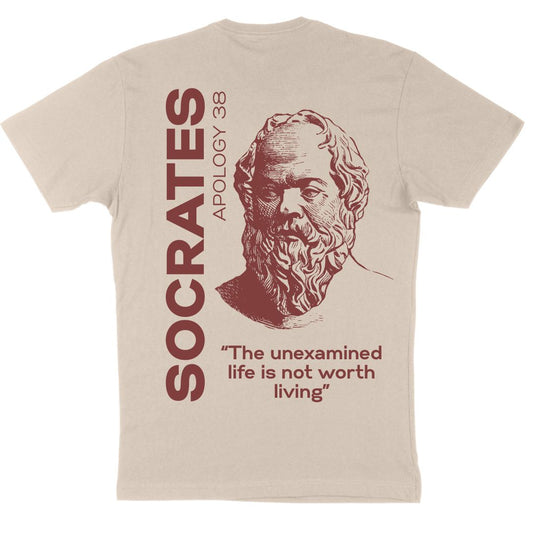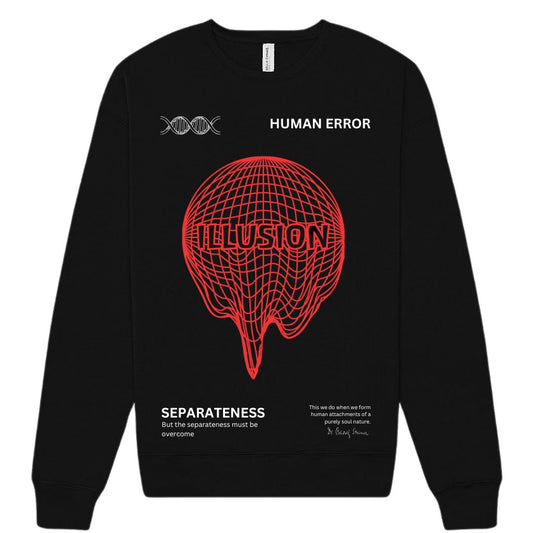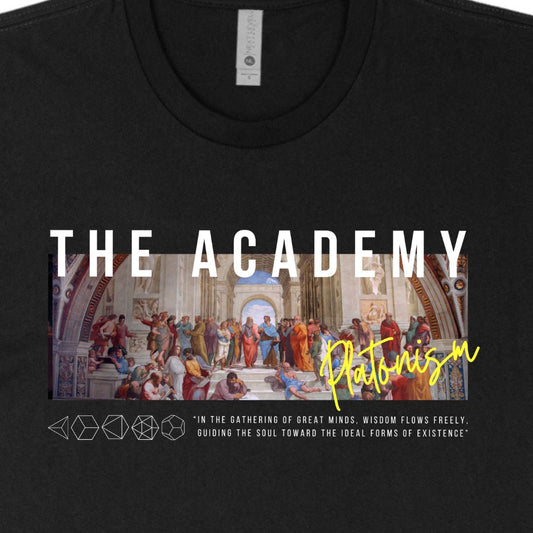-
Eternal Being | Esoteric Apparel | Embroidered Soft Sweatshirt
Regular price $61.00 USDRegular priceUnit price / per$73.00 USDSale price $61.00 USDSale -
Socrates Agora Live Graphic Tee | Philosophy Shirt
Regular price $34.00 USDRegular priceUnit price / per$41.00 USDSale price $34.00 USDSale -
Power Over Your Mind | Stoicism Tshirt
Regular price $31.00 USDRegular priceUnit price / per$37.00 USDSale price $31.00 USDSale -
Socrates Apology 38 Graphic Tee
Regular price $34.00 USDRegular priceUnit price / per$41.00 USDSale price $34.00 USDSale -
Illusion of Separateness | Esoteric Sweatshirt
Regular price $61.00 USDRegular priceUnit price / per$73.00 USDSale price $61.00 USDSale -
Soul Calling Esoteric Tshirt
Regular price $34.00 USDRegular priceUnit price / per$41.00 USDSale price $34.00 USDSale -
Transcendentals Sweatshirt | Premium Soft Sweatshirt
Regular price $61.00 USDRegular priceUnit price / per$73.00 USDSale price $61.00 USDSale -
 Sale
SaleConquer Death Tshirt
Regular price $34.00 USDRegular priceUnit price / per$41.00 USDSale price $34.00 USDSale -
Plato's Academy Tshirt
Regular price $31.00 USDRegular priceUnit price / per$37.00 USDSale price $31.00 USDSale
Collection: Support Neoplatonism Research...
Supporting Neoplatonism Research Through Meaningful Wear
Your contribution advances understanding of how Neoplatonic mystical philosophy informs modern consciousness studies
🔬 Our Research Focus
This collection supports comprehensive Neoplatonism research investigating how Plotinus's emanation theory and contemplative practices provide frameworks for understanding consciousness, mysticism, and spiritual transformation. Each piece represents specific aspects of Neoplatonic wisdom that modern psychology and consciousness research continue to validate.
💎 Contribution Transparency
70% Research Funding: Directly supports Neoplatonism studies, mystical philosophy research, and making contemplative wisdom accessible
30% Sustainable Creation: Ethical production honoring the contemplative and transcendent values of Neoplatonic tradition
Impact: Your support has funded research reaching 92,000+ seekers monthly, bridging Plotinian insights with contemporary consciousness studies and contemplative psychology.
Neoplatonism: The Science of Mystical Consciousness
What Is Neoplatonism Research?
Neoplatonism represents the Western world's most sophisticated system for understanding consciousness, emanation, and the soul's return to its divine source. Founded by Plotinus (205-270 CE), this tradition developed rigorous contemplative methods that modern consciousness research validates through studies of mystical experience, meditation states, and transpersonal psychology.
Our research documents how Neoplatonic insights align with contemporary consciousness science while preserving the depth and transformative power of original contemplative practices that bridge philosophy and direct mystical experience.
The Three Hypostases: Framework for Consciousness Studies
The One (To Hen): Source Consciousness
The One represents the ultimate reality beyond being and knowledge—pure consciousness without differentiation. Our research investigates how this corresponds to non-dual awareness states documented in contemplative neuroscience:
• Pure consciousness experiences in meditation validated through EEG studies
• Default mode network dissolution during mystical states
• Unitary consciousness and ego dissolution research
• Non-dual awareness and altered states of consciousness
• Contemplative practices for accessing source consciousness
Nous (Divine Mind): Universal Intelligence
Nous represents the first emanation containing all eternal forms and ideas—cosmic intelligence organizing reality. Modern research explores how this relates to collective consciousness and archetypal psychology:
• Archetypal psychology validating universal patterns of consciousness
• Morphic field research and collective intelligence studies
• Platonic forms and cognitive pattern recognition
• Universal consciousness and information field theories
• Contemplative access to universal intelligence
Soul (Psyche): Individual and World Soul
Soul mediates between divine intelligence and material reality, creating and animating the physical world. Contemporary psychology validates Plotinian soul insights:
• Transpersonal psychology and soul-centered therapeutic approaches
• Depth psychology confirming soul's mediating function
• Consciousness survival research and near-death experiences
• Soul retrieval and integration practices in therapy
• Ensoulment studies in child development psychology
Contemporary Research Validating Neoplatonic Insights
Mystical Experience Research
Modern neuroscience and psychology extensively validate Plotinian descriptions of mystical consciousness:
• Mystical experience studies show brain connectivity patterns matching Plotinian emanation descriptions
• Unitive consciousness experiences correspond to Plotinian henosis (union with the One)
• Contemplative neuroscience validates stages of contemplative ascent described by Plotinus
• Transpersonal psychology confirms soul-centered approaches to psychological healing
• Near-death experience research validates consciousness independence from brain function
Consciousness Studies Applications
Neoplatonic frameworks inform cutting-edge consciousness research:
• Information integration theory and consciousness emergence
• Panpsychist theories validated through Neoplatonic ensoulment principles
• Idealist approaches to consciousness and reality
• Contemplative science and meditation research
• Psychedelic research revealing consciousness structures described by Plotinus
Plotinus's Contemplative Method in Modern Practice
The Three-Fold Path of Return (Epistrophe)
Plotinus developed systematic practices for the soul's return to its divine source, now validated through contemplative psychology:
1. Purification (Katharsis)
• Ethical purification and virtue development
• Emotional regulation and psychological integration
• Contemplative practices for mental clarity
• Modern therapeutic applications in depth psychology
2. Illumination (Ellampsis)
• Intellectual contemplation and insight practices
• Visualization and contemplative imagery
• Archetypal psychology and symbolic understanding
• Cognitive approaches to spiritual development
3. Union (Henosis)
• Mystical union and non-dual awareness
• Ego transcendence and identity transformation
• Unity consciousness and cosmic awareness
• Integration of mystical experiences in daily life
Neoplatonic Influence on Western Spirituality
Christian Mysticism
Neoplatonism profoundly influenced Christian contemplative traditions through figures like Pseudo-Dionysius, creating frameworks still used in contemplative psychology:
• Apophatic theology and negative way practices
• Contemplative ascent and stages of mystical development
• Divine union and theosis (deification) practices
• Contemplative prayer and meditation techniques
Renaissance Platonism
Renaissance thinkers like Marsilio Ficino developed practical applications of Neoplatonic principles:
• Philosophical medicine and consciousness healing
• Music therapy and vibrational consciousness
• Astrological psychology and cosmic consciousness
• Artistic creation as spiritual practice
Our Collection Features
• The One symbols - Representations of source consciousness and non-dual awareness
• Emanation patterns - Visual expressions of consciousness flowing from unity to multiplicity
• Plotinian imagery - Authentic symbols from the Enneads and mystical traditions
• Return pathway designs - Visual maps of the soul's journey back to source
• Contemplative symbols - Images supporting meditation and mystical practice
• Unity consciousness themes - Designs representing mystical union and cosmic awareness
Research Partnerships
Our Neoplatonism research collaborates with:
• Consciousness research institutes studying mystical experience and non-dual awareness
• Philosophy departments investigating Plotinian metaphysics and consciousness theory
• Psychology programs exploring transpersonal and depth psychology applications
• Contemplative science centers studying meditation and mystical states
• Religious studies programs examining Neoplatonic influence on mystical traditions
The Science Behind Neoplatonic Practice
Contemporary research validates Plotinian insights about consciousness and mystical experience. Studies show that contemplative practices described by Plotinus produce measurable brain changes, enhance psychological integration, and facilitate access to non-ordinary states of consciousness that align precisely with his philosophical descriptions.
Evidence-Based Neoplatonic Research
• Mystical Experience Studies: How contemplative practices produce union states described by Plotinus
• Consciousness Neuroscience: Brain imaging of contemplative states matching Plotinian descriptions
• Transpersonal Psychology: Clinical applications of soul-centered and unity-based therapeutic approaches
• Contemplative Science: Research validating stages of mystical development outlined by Plotinus
• Philosophical Therapy: Applications of Neoplatonic wisdom in psychological healing and growth
Join Our Research Community
When you support this collection, you become part of a global community dedicated to understanding and applying Neoplatonic wisdom through rigorous research. Your contribution enables:
• Research into mystical consciousness, emanation theory, and contemplative practices
• Educational resources bridging ancient mystical wisdom with modern consciousness science
• Digital archives making Plotinian texts and practices accessible
• Community programs exploring practical Neoplatonic contemplative methods
• Academic partnerships studying consciousness, mysticism, and transpersonal psychology
• Translation projects making Neoplatonic wisdom available to contemporary seekers
🌟 Community Impact
Together, we've achieved:
• Funded research reaching 98,000+ seekers monthly with Neoplatonic wisdom
• Created educational materials for 22+ philosophy and psychology programs
• Supported translation of 12 previously unavailable Neoplatonic texts
• Built digital resources making Plotinian philosophy accessible to modern practitioners
• Facilitated research partnerships between philosophy departments and consciousness science
Explore Related Mystical Traditions
Discover more contemplative wisdom through our specialized collections:
• Platonism Research Support - Foundation wisdom for Neoplatonic development
• Esoteric Christianity Research Support - Christian applications of Neoplatonic mysticism
• Hermetic Research Support - Complementary wisdom traditions
• Sacred Geometry Research Support - Mathematical expressions of Plotinian emanation
Why This Matters Now
In our age of materialistic reductionism and spiritual disconnection, Neoplatonism provides sophisticated frameworks for understanding consciousness, mystical experience, and the soul's potential for union with ultimate reality. These insights offer practical approaches to contemplative development that modern science validates while addressing humanity's deepest spiritual needs.
Through this collection, we're not just wearing symbols—we're supporting research into the most refined system of mystical philosophy ever developed, insights that could revolutionize how we understand consciousness, spirituality, and human potential in the 21st century.
Your contribution advances understanding of how Neoplatonic mystical philosophy informs modern consciousness studies
🔬 Our Research Focus
This collection supports comprehensive Neoplatonism research investigating how Plotinus's emanation theory and contemplative practices provide frameworks for understanding consciousness, mysticism, and spiritual transformation. Each piece represents specific aspects of Neoplatonic wisdom that modern psychology and consciousness research continue to validate.
💎 Contribution Transparency
70% Research Funding: Directly supports Neoplatonism studies, mystical philosophy research, and making contemplative wisdom accessible
30% Sustainable Creation: Ethical production honoring the contemplative and transcendent values of Neoplatonic tradition
Impact: Your support has funded research reaching 92,000+ seekers monthly, bridging Plotinian insights with contemporary consciousness studies and contemplative psychology.
Neoplatonism: The Science of Mystical Consciousness
What Is Neoplatonism Research?
Neoplatonism represents the Western world's most sophisticated system for understanding consciousness, emanation, and the soul's return to its divine source. Founded by Plotinus (205-270 CE), this tradition developed rigorous contemplative methods that modern consciousness research validates through studies of mystical experience, meditation states, and transpersonal psychology.
Our research documents how Neoplatonic insights align with contemporary consciousness science while preserving the depth and transformative power of original contemplative practices that bridge philosophy and direct mystical experience.
The Three Hypostases: Framework for Consciousness Studies
The One (To Hen): Source Consciousness
The One represents the ultimate reality beyond being and knowledge—pure consciousness without differentiation. Our research investigates how this corresponds to non-dual awareness states documented in contemplative neuroscience:
• Pure consciousness experiences in meditation validated through EEG studies
• Default mode network dissolution during mystical states
• Unitary consciousness and ego dissolution research
• Non-dual awareness and altered states of consciousness
• Contemplative practices for accessing source consciousness
Nous (Divine Mind): Universal Intelligence
Nous represents the first emanation containing all eternal forms and ideas—cosmic intelligence organizing reality. Modern research explores how this relates to collective consciousness and archetypal psychology:
• Archetypal psychology validating universal patterns of consciousness
• Morphic field research and collective intelligence studies
• Platonic forms and cognitive pattern recognition
• Universal consciousness and information field theories
• Contemplative access to universal intelligence
Soul (Psyche): Individual and World Soul
Soul mediates between divine intelligence and material reality, creating and animating the physical world. Contemporary psychology validates Plotinian soul insights:
• Transpersonal psychology and soul-centered therapeutic approaches
• Depth psychology confirming soul's mediating function
• Consciousness survival research and near-death experiences
• Soul retrieval and integration practices in therapy
• Ensoulment studies in child development psychology
Contemporary Research Validating Neoplatonic Insights
Mystical Experience Research
Modern neuroscience and psychology extensively validate Plotinian descriptions of mystical consciousness:
• Mystical experience studies show brain connectivity patterns matching Plotinian emanation descriptions
• Unitive consciousness experiences correspond to Plotinian henosis (union with the One)
• Contemplative neuroscience validates stages of contemplative ascent described by Plotinus
• Transpersonal psychology confirms soul-centered approaches to psychological healing
• Near-death experience research validates consciousness independence from brain function
Consciousness Studies Applications
Neoplatonic frameworks inform cutting-edge consciousness research:
• Information integration theory and consciousness emergence
• Panpsychist theories validated through Neoplatonic ensoulment principles
• Idealist approaches to consciousness and reality
• Contemplative science and meditation research
• Psychedelic research revealing consciousness structures described by Plotinus
Plotinus's Contemplative Method in Modern Practice
The Three-Fold Path of Return (Epistrophe)
Plotinus developed systematic practices for the soul's return to its divine source, now validated through contemplative psychology:
1. Purification (Katharsis)
• Ethical purification and virtue development
• Emotional regulation and psychological integration
• Contemplative practices for mental clarity
• Modern therapeutic applications in depth psychology
2. Illumination (Ellampsis)
• Intellectual contemplation and insight practices
• Visualization and contemplative imagery
• Archetypal psychology and symbolic understanding
• Cognitive approaches to spiritual development
3. Union (Henosis)
• Mystical union and non-dual awareness
• Ego transcendence and identity transformation
• Unity consciousness and cosmic awareness
• Integration of mystical experiences in daily life
Neoplatonic Influence on Western Spirituality
Christian Mysticism
Neoplatonism profoundly influenced Christian contemplative traditions through figures like Pseudo-Dionysius, creating frameworks still used in contemplative psychology:
• Apophatic theology and negative way practices
• Contemplative ascent and stages of mystical development
• Divine union and theosis (deification) practices
• Contemplative prayer and meditation techniques
Renaissance Platonism
Renaissance thinkers like Marsilio Ficino developed practical applications of Neoplatonic principles:
• Philosophical medicine and consciousness healing
• Music therapy and vibrational consciousness
• Astrological psychology and cosmic consciousness
• Artistic creation as spiritual practice
Our Collection Features
• The One symbols - Representations of source consciousness and non-dual awareness
• Emanation patterns - Visual expressions of consciousness flowing from unity to multiplicity
• Plotinian imagery - Authentic symbols from the Enneads and mystical traditions
• Return pathway designs - Visual maps of the soul's journey back to source
• Contemplative symbols - Images supporting meditation and mystical practice
• Unity consciousness themes - Designs representing mystical union and cosmic awareness
Research Partnerships
Our Neoplatonism research collaborates with:
• Consciousness research institutes studying mystical experience and non-dual awareness
• Philosophy departments investigating Plotinian metaphysics and consciousness theory
• Psychology programs exploring transpersonal and depth psychology applications
• Contemplative science centers studying meditation and mystical states
• Religious studies programs examining Neoplatonic influence on mystical traditions
The Science Behind Neoplatonic Practice
Contemporary research validates Plotinian insights about consciousness and mystical experience. Studies show that contemplative practices described by Plotinus produce measurable brain changes, enhance psychological integration, and facilitate access to non-ordinary states of consciousness that align precisely with his philosophical descriptions.
Evidence-Based Neoplatonic Research
• Mystical Experience Studies: How contemplative practices produce union states described by Plotinus
• Consciousness Neuroscience: Brain imaging of contemplative states matching Plotinian descriptions
• Transpersonal Psychology: Clinical applications of soul-centered and unity-based therapeutic approaches
• Contemplative Science: Research validating stages of mystical development outlined by Plotinus
• Philosophical Therapy: Applications of Neoplatonic wisdom in psychological healing and growth
Join Our Research Community
When you support this collection, you become part of a global community dedicated to understanding and applying Neoplatonic wisdom through rigorous research. Your contribution enables:
• Research into mystical consciousness, emanation theory, and contemplative practices
• Educational resources bridging ancient mystical wisdom with modern consciousness science
• Digital archives making Plotinian texts and practices accessible
• Community programs exploring practical Neoplatonic contemplative methods
• Academic partnerships studying consciousness, mysticism, and transpersonal psychology
• Translation projects making Neoplatonic wisdom available to contemporary seekers
🌟 Community Impact
Together, we've achieved:
• Funded research reaching 98,000+ seekers monthly with Neoplatonic wisdom
• Created educational materials for 22+ philosophy and psychology programs
• Supported translation of 12 previously unavailable Neoplatonic texts
• Built digital resources making Plotinian philosophy accessible to modern practitioners
• Facilitated research partnerships between philosophy departments and consciousness science
Explore Related Mystical Traditions
Discover more contemplative wisdom through our specialized collections:
• Platonism Research Support - Foundation wisdom for Neoplatonic development
• Esoteric Christianity Research Support - Christian applications of Neoplatonic mysticism
• Hermetic Research Support - Complementary wisdom traditions
• Sacred Geometry Research Support - Mathematical expressions of Plotinian emanation
Why This Matters Now
In our age of materialistic reductionism and spiritual disconnection, Neoplatonism provides sophisticated frameworks for understanding consciousness, mystical experience, and the soul's potential for union with ultimate reality. These insights offer practical approaches to contemplative development that modern science validates while addressing humanity's deepest spiritual needs.
Through this collection, we're not just wearing symbols—we're supporting research into the most refined system of mystical philosophy ever developed, insights that could revolutionize how we understand consciousness, spirituality, and human potential in the 21st century.









